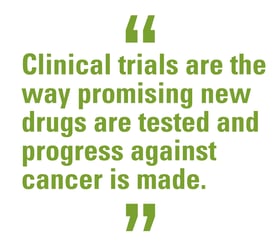
ICYMI: The Importance of Enrolling in Clinical Trials
Print
01 July 2015
Emma Van Hook / PhRMA
Clinical trials are a crucial step in the long and costly process of researching and developing a new medicine to address substantial unmet medical needs in such areas as Alzheimer’s, cancer, and many rare diseases. At the center of the clinical trial process is the patient. In an Op Ed in the New York Times, Stan Collender reflects on his own experiences as a cancer patient and the importance of participating in clinical research.
 However Collender notes that only 3% of all cancer patients participate in clinical trials, which is a huge problem – the lack of patients willing to participate leads to delays in the timely completion of trials, which in turn increases the time it takes to get medicines approved and available to patients more broadly. In cancer especially, patients don’t have the luxury of time.
However Collender notes that only 3% of all cancer patients participate in clinical trials, which is a huge problem – the lack of patients willing to participate leads to delays in the timely completion of trials, which in turn increases the time it takes to get medicines approved and available to patients more broadly. In cancer especially, patients don’t have the luxury of time.
There are many reasons patients may not enroll in clinical trials. Many are not aware that a trial exists for their disease, and often their physicians aren’t either. It can be difficult to find the right trial, and sometimes a bit scary to receive treatment with an investigational drug that is still undergoing testing.
But that’s also the reason clinical trials are so crucial. By enrolling in a clinical trial, patients have the opportunity to receive some of the most promising medicines in the pipeline. New treatments offer hope for the future – for better quality of life, for fewer side effects, and for longer life. Clinical trials not only give researchers a greater understanding of how a particular medicine is best used including appropriate dosing, they generate important data that inform new paths forward in shaping the next generation of medicines.
Collender’s doctor referred to him as a “pioneer,” and that is exactly right. As Collender noted, “I really like to think of myself as the equivalent of a test pilot like Chuck Yeager and the early astronauts. The difference is that, instead of testing aircraft and aerospace vehicles, I’m testing the efficacy of a drug that may cure my cancer, or at least prolong my life and the lives of others. Being a test pilot is a far more romantic, daring and audacious notion than being a lab rat. In the fight against cancer, it’s also more accurate.”
All Portfolio
MEDIA CENTER
-
The RMI group has completed sertain projects
The RMI Group has exited from the capital of portfolio companies:
Marinus Pharmaceuticals, Inc.,
Syndax Pharmaceuticals, Inc.,
Atea Pharmaceuticals, Inc.

